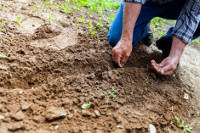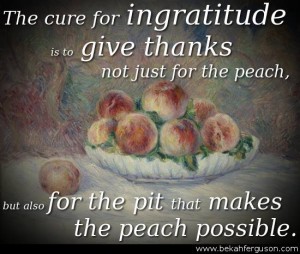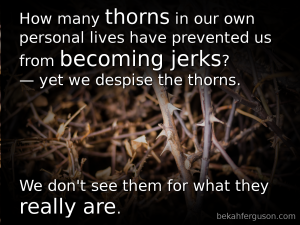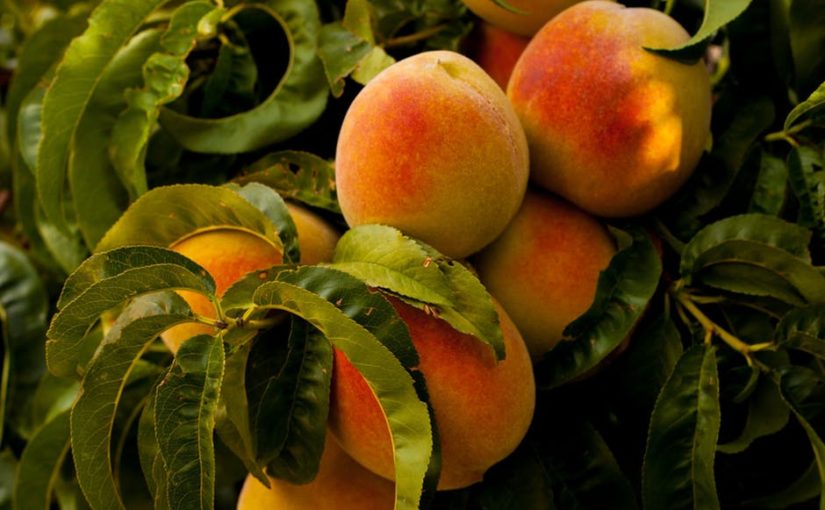The heavens are yours, and yours also the earth; you founded the world and all that is in it. (Psalm 89:11)
In my last post, Pt.3, Good Himself, I looked at mankind’s love of storytelling and heroes. The same theme is used again and again of a good man, a saviour, willing to sacrifice his very life in order to save the lives of others: Good must always triumph over evil.
“But he who dares not grasp the thorn
Should never crave the rose.”

Ever wondered what an ideal life would be like? An Edenic existence?
Would it be like a luxury vacation, drinks on hand; housekeeping fairies to make your bed and put fresh towels in the bathroom; gourmet chefs to prepare your meals, staff to wash the dishes. Would it be like Downton Abbey where you don’t even have to dress yourself?
If yes, then many people already enjoy this ideal life. But are they happy?
Substance abuse, eating disorders, infidelity, divorce, and suicide rates amongst the very rich suggest they are not. Furthermore, those housekeeping fairies are actually real people who have to work hard. Not everyone can live the life of Riley, because Riley requires a host of servants.
Adam and Eve, however, led the original Edenic life, and they did not have servants. Nevertheless, they were required to tend the garden. And anyone who has tended a garden knows this is grubby work involving soiled knees and dirt-caked hands. “The Lord God took the man and put him in the Garden of Eden to work it and take care of it” (Genesis 2:15).
Were Adam and Eve thankful to have all their needs provided for, working for pleasure rather than sustenance? Were they content? It seems they were not. Why else the forbidden fruit? Why does anyone taste forbidden fruit unless they hope, deep down, that this is the final thing they need to be fulfilled?
Ann Voskamp, best-selling author of One Thousand Gifts, says the first sin stemmed from a spirit of ingratitude. C.S. Lewis said it came from pride, just as it did for Lucifer. But these are not contrary statements, since pride and ingratitude go hand in hand: when we have a sense of entitlement (pride), thinking we deserve better (discontentment), we become ungrateful.
So, what happened to Adam and Eve when they became prideful and ungrateful, setting themselves up to be gods, and ate the forbidden fruit?
“Cursed is the ground because of you; through painful toil you will eat food from it all the days of your life. It will produce thorns and thistles for you, and you will eat the plants of the field. By the sweat of your brow you will eat your food until you return to the ground, since from it you were taken; for dust you are and to dust you will return.” (Genesis 3:17-19)
1) Tending a garden before the earth was cursed must have been a very pleasant thing, despite the labor involved and the grimy hands. Climatic conditions meant a perfect amount of water and sun to keep things growing optimally. Indeed even today many people enjoying gardening and consider it therapeutic. But after the Fall, this burden to produce all our own food became back-breaking labor for many people; particularly in unfavorable conditions like heat and drought. It would seem all the joy was sucked out of it.
2) The very thing (dirt) that brings us life is the very thing that will one day absorb the life out of us too (death). The peach comes with a pit.
3) What we refer to as the Curse, the Fall, might also be the cure. The cure for ingratitude.
Why? Because everything was handed to Adam and Eve, hassle-free, on a platter, and they were not content.
Consider: what feels better than serving a delicious meal one worked hard to prepare? Or buying groceries with a hard-earned paycheque. Clean clothes one scrubbed and washed. A diploma studied hard for, a promotion, a baby born after a wearisome nine months. A rewarding relationship that took years to cultivate. A work of art from many hours or months of meticulous sculpting. Even a tropical vacation requires the discipline of setting aside funds until enough is saved.
It would seem there is more satisfaction and fulfillment (read: contentment) when one has worked hard for something, than when it is simply handed over. It’s interesting to note how many lottery winners go bankrupt. Or how college students who have to pay their own tuition typically get better grades than the ones whose parents paid their expenses.
Ann Voskamp, who is a farmer’s wife, calls this principle of toiling with the dirt to produce good food as “dust farming dust.” She also said this:
“What I sweep off the floor, what I wash from their jeans, what I scrub off hands, this that we’re made of but disdain, that we paint and moisturize, swath and sculpt, this dirt is the earth’s one resource that nourishes our stomachs, sustains our limbs. . . . Dirt-tilling is to understand Genesis work, to steward and cultivate His creation. It is to embrace gospel living: the good news that God provides.”
This that we’re made of but disdain.
A nourishing meal means a stack of dirty dishes to be washed. Freshly fallen snow sparkling in the sunshine means driveways to be shoveled. Babies mean sleepless nights and diaper changes. A paycheque means having a job. An attractive lawn must be raked and mowed. A relationship must be nurtured through daily effort and sacrifice. A dog must be walked. The list goes on and on. We give thanks for the former and complain about the latter.
Even pain is a gift, did you know? Those who can not feel pain have a disease called leprosy. Because they can’t feel pain, they injure themselves over and over all day long. Chronic infections then result in the loss of extremities. We just don’t realize how invaluable pain is in keeping our bodies safe. We want health without ever feeling pain. We want the flower without its soiled roots. We want the olive and the plum and the peach without their pits; watermelons, grapes, and oranges without their seeds.
But here’s the thing about genetically modified fruits: they are already dead, already decaying as you put them in your mouth. No new life can come from them. A cut flower in a vase will soon wither and die; with no roots, it can not sustain life. This is because within the dark dirty soil that we so detest, the roots are being nourished, giving life to the flower; the seed too is nourished in the dark depths, giving birth to brand new growth.
The cure for ingratitude is to give thanks not just for the peach, but also for the pit that makes the peach possible.
 Yes, the hard times. The chores, the labor, the sweat and tears – all the strenuous efforts that must be made in order to enjoy the peach and the flower. The same God who gave us all these bountiful flourishing gifts also gave us the grimy soil and the rain.
Yes, the hard times. The chores, the labor, the sweat and tears – all the strenuous efforts that must be made in order to enjoy the peach and the flower. The same God who gave us all these bountiful flourishing gifts also gave us the grimy soil and the rain.
C.S. Lewis said, “The highest does not stand without the lowest.” In other words, you can’t have the greater without the lesser.
How must it look to our generous Creator when we break bread and eat, while complaining about how much work it was to thresh the wheat? Worse still, how many unknown miracles and mercies have we spat upon and cursed in our lifetimes? As just one of innumerable examples, what if being delayed in traffic spared us from a serious accident that would have occurred farther down the road otherwise? And here we complained about the inconvenience instead of giving thanks.
When Jesus died on the cross, the Bible tells us He went down to Hades . . . to Hell . . . to the very Pit.
1 Peter 3:18b-20 (NLT) says,
“He [Jesus] suffered physical death, but he was raised to life in the Spirit. So he went and preached to the spirits in prison—those who disobeyed God long ago when God waited patiently while Noah was building his boat.”
If Jesus had not died and gone down to the pit, the dungeon, there would be no Resurrection, there would be no new life in Christ.
We can’t have one without the other. Even the darkest pit can be blessed and redeemed by God. Joseph, in the Old Testament, who was dumped into a deep well (a pit), then delivered into slavery by his brothers, and thrown into prison unjustly by a disgruntled woman, eventually became second most powerful to the Pharaoh. This is what he said about his trials and tribulations to his brothers:
“You intended to harm me, but God intended it for good to accomplish what is now being done, the saving of many lives” (Genesis 50:20).
All of creation testifies to the Gospel message of new life coming from death: regeneration, restoration, redemption, resurrection. It’s witnessed in every seed-bearing plant, every eco-system. And when we follow Christ, the Rose of Sharon, we too must carry a cross: yet by His stripes, we are healed (Isaiah 53:5).
 The Apostle Paul said, “Therefore, in order to keep me from becoming conceited, I was given a thorn in my flesh, a messenger of Satan, to torment me” (2 Corinthians 12:7). This thorn was a gift in disguise. The curse was a cure.
The Apostle Paul said, “Therefore, in order to keep me from becoming conceited, I was given a thorn in my flesh, a messenger of Satan, to torment me” (2 Corinthians 12:7). This thorn was a gift in disguise. The curse was a cure.
What Satan meant for harm, God intended for good; to prevent Paul from becoming a jerk. How many thorns in our own personal lives have prevented us too from becoming jerks – yet we despise the thorns. We don’t see them for what they really are. Paul goes on to say:
“That is why, for Christ’s sake, I delight in weaknesses, in insults, in hardships, in persecutions, in difficulties. For when I am weak, then I am strong” (vs. 10).
So, in the end, we each have a choice to make: We can either break our teeth on the pit and let a bitter root grow in its stead, or we can allow God to foster a heart of fertile soil within us (gratitude) to embrace the pit.
“The stone the builders rejected has become the cornerstone” (Psalm 18:22).
Image of thorns by Robert S. Donovan. Some rights reserved.


12 thoughts on “The Peach Comes With a Pit – how the curse is the cure for ingratitude”